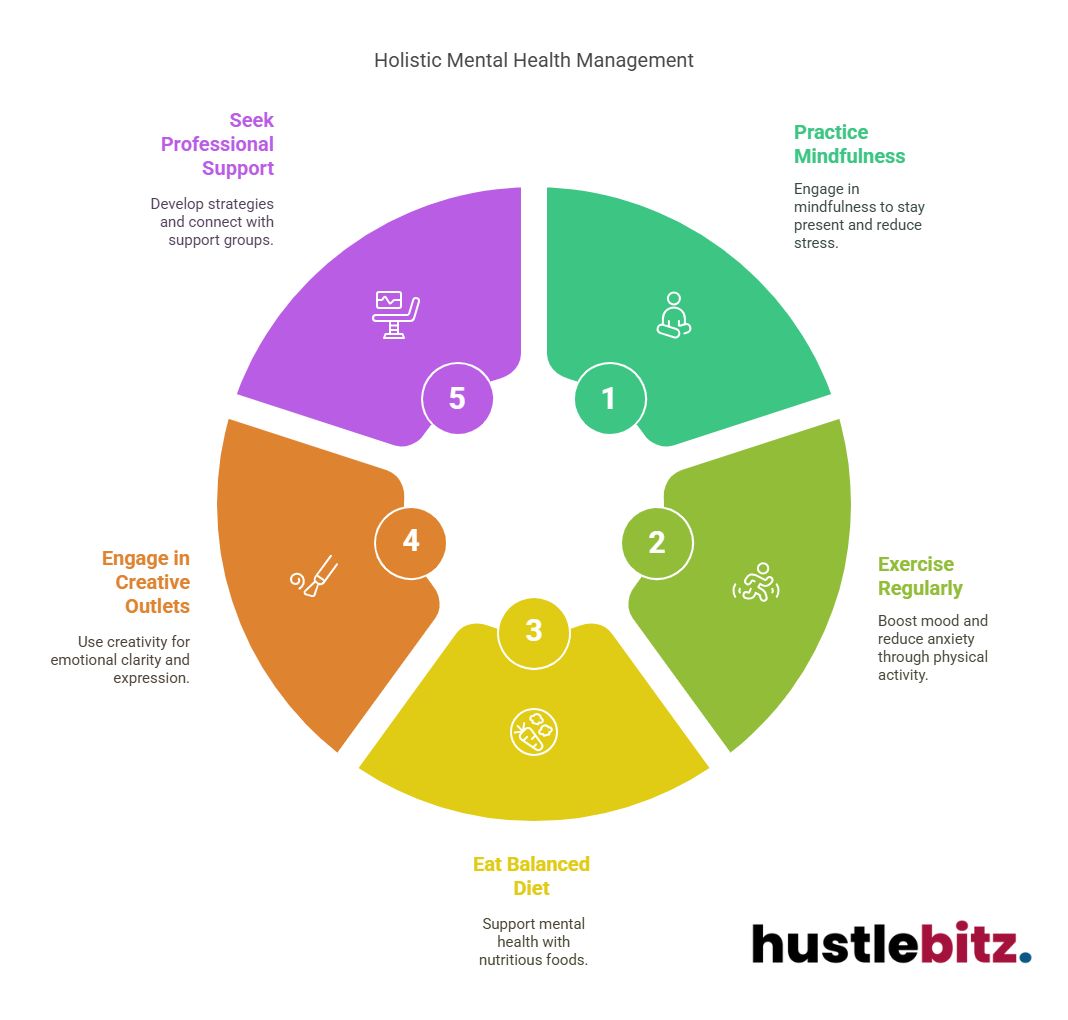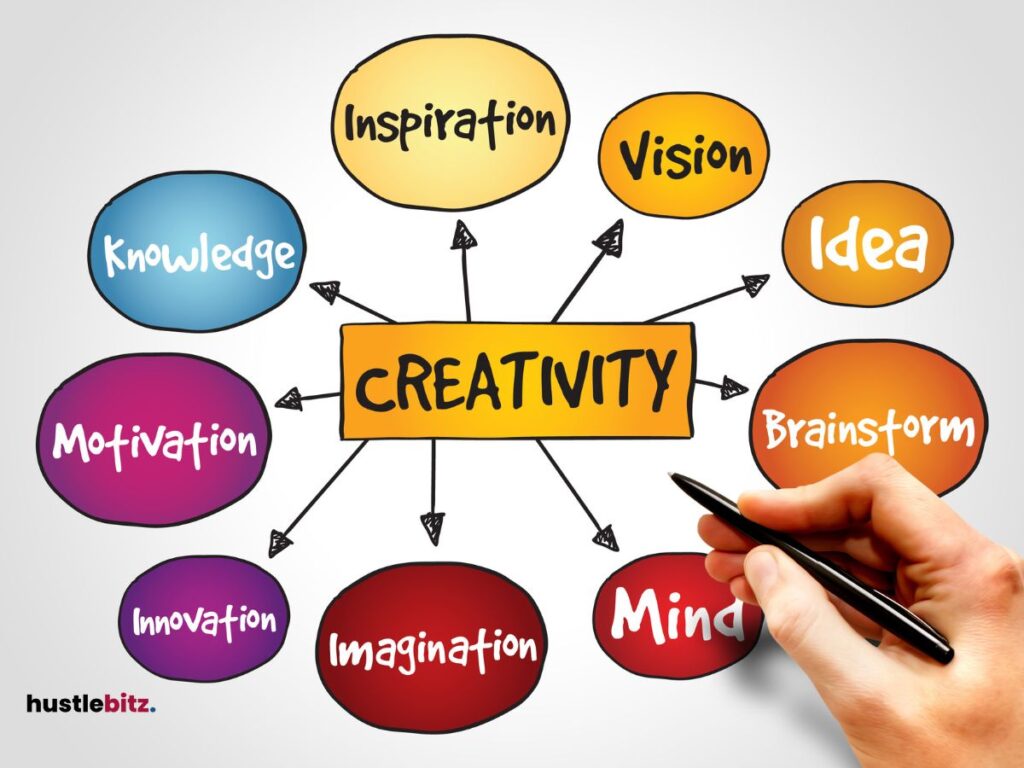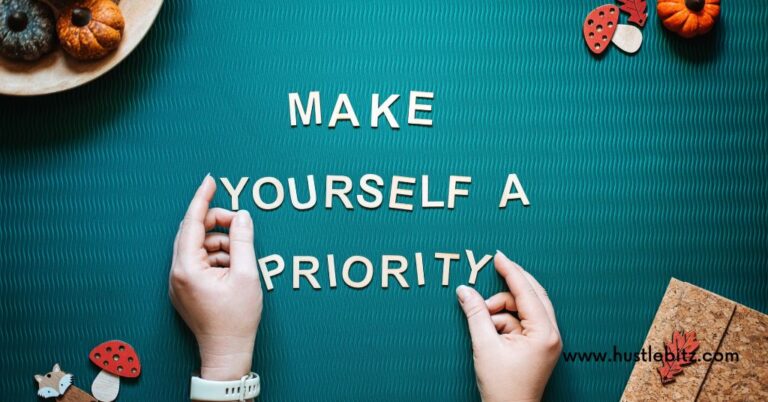Incorporating self-care strategies into your life can significantly improve your mental health and resilience. By practicing mindfulness, you can reduce stress and become more aware of the present moment. Regular physical activity like walking or participating in group classes can uplift your mood and boost self-esteem through the release of endorphins. A balanced diet that includes plenty of fruits, vegetables, and lean proteins supports brain function and promotes emotional well-being. Engaging in creative activities allows for self-expression and emotional clarity, while seeking professional support can provide valuable tools to help manage mental health challenges. Exploring these strategies further can deepen your understanding of how to nurture your mental well-being.
Key Takeaways
- Incorporate mindfulness practices such as breath awareness and body scans to manage stress and stay grounded in the present.
- Make regular physical activity a part of your routine to boost your mood and alleviate symptoms of anxiety and depression through the natural release of endorphins.
- Support your mental health with a balanced diet full of fruits, vegetables, whole grains, and lean proteins.
- Find creative outlets like art, music, or writing to express yourself and gain emotional clarity, enhancing your overall well-being.
- Seek professional support to develop tailored strategies, learn new skills, and connect with support groups that can help you manage your mental health.

Understanding Self-Care

Self-care involves a range of intentional actions and practices that people use to enhance their well-being and maintain their mental health. In today’s fast-paced world, it’s more important than ever to prioritize self-care. By doing so, you create a foundation for mental well-being, making it easier to handle stress and navigate life’s challenges.
By making self-care a priority, you can build resilience and improve your emotional well-being. This might include regular physical activity, eating a balanced diet, staying connected with loved ones, or pursuing hobbies that bring you joy and relaxation. Each of these activities contributes to a holistic approach to self-care, helping you recharge and avoid feelings of anxiety or burnout.
Self-care strategies can be customized to fit individual needs and preferences, making them accessible to everyone. This practice empowers you to recognize your limits and take proactive steps to maintain your mental health. By setting aside time for self-care, you create a buffer against stressors, enhancing your ability to cope with adversity.
The Power of Mindfulness

Mindfulness is a powerful tool rooted in ancient practices, and it has become increasingly recognized for its ability to enhance mental health by fostering present-moment awareness and reducing stress.
When you practice mindfulness, you deepen your connection to your thoughts and emotions, allowing you to respond thoughtfully to challenges rather than reacting impulsively. This practice is essential in any self-care strategy aimed at improving your mental health and emotional well-being.
Here are three key aspects of mindfulness that can significantly enhance your self-care routine:
- Breath Awareness: Focusing on your breath can ground you in the present moment, helping to ease anxiety and create a sense of calm.
- Body Scan: Paying attention to physical sensations throughout your body encourages relaxation and helps release emotional tension.
- Mindful Observation: Observing your surroundings without judgment can increase your appreciation for life’s subtle details, fostering a positive mindset.
By incorporating these mindfulness techniques into your daily routine, you can better manage stress, improve your emotional health, and ultimately enhance your mental health.
Whether through meditation, mindful walking, or simply taking a few moments to pause and breathe, these self-care practices can help you navigate your thoughts and feelings with greater clarity.
As you embrace the power of mindfulness, you may notice a profound improvement in your overall well-being, leading to a more balanced and fulfilling life.
Incorporating Physical Activity
Making regular physical activity a part of your daily life can significantly enhance your mental health by reducing symptoms of anxiety and depression while also promoting emotional well-being. Physical activity is a crucial component of self-care because it empowers you to take control of your mental health. This doesn’t have to mean intense workouts; even simple activities like walking or gardening can make a positive difference.
Research shows that regular exercise stimulates the release of endorphins, which are natural chemicals in your brain that lift your mood. This natural response can help you manage stress and anxiety effectively. Additionally, regular physical activity can increase your sense of accomplishment and boost your self-esteem, both of which are important for maintaining mental health.
Integrating physical activity into your daily life doesn’t require a strict or demanding exercise routine. Instead, you can find activities that fit your preferences and lifestyle, such as group classes, sports, or outdoor activities.
Ultimately, self-care means recognizing the importance of your physical health as a foundation for mental well-being. By making regular exercise a priority, you can build resilience against life’s challenges, enhance your mood, and improve your overall well-being.
In doing so, you create a proactive strategy that not only addresses mental health concerns but also enriches your life experience.
Nourishing Your Body

Taking care of your body by following a balanced diet is essential for supporting your mental health because the nutrients you get from food play a vital role in brain function and emotional regulation.
Self-care means taking steps to care for your body, and eating a nutritious diet is a fundamental part of this effort. A well-rounded diet helps maintain both physical and mental health, giving you the energy and resilience needed to handle everyday challenges.
To support your mental health through nutrition, consider incorporating the following into your meals:
- Fruits and Vegetables: Packed with vitamins, minerals, and antioxidants, these foods help combat oxidative stress and inflammation, both of which can negatively impact mood and cognitive function.
- Whole Grains: Foods like brown rice, quinoa, and oats provide complex carbohydrates that stabilize blood sugar levels, ensuring steady energy and mood throughout the day.
- Lean Proteins: Sources such as chicken, fish, beans, and legumes are essential for producing neurotransmitters that regulate emotions, helping maintain a balanced mood and clear focus.
Engaging in Creative Outlets

Engaging in creative outlets can significantly enhance mental well-being, providing a valuable means of self-expression and emotional release. Whether through art, music, writing, or other forms of creativity, these self-care activities serve as effective tools to boost your mood and foster emotional support. Engaging in such pursuits allows individuals to channel their feelings constructively, often leading to a greater sense of accomplishment and joy.
Participating in creative activities can also provide a much-needed distraction from daily stressors. The process of creating can induce a state of flow, allowing one to be present in the moment and reducing anxiety. Moreover, expressing oneself creatively can help clarify thoughts and feelings, contributing to improved mental clarity and emotional resilience.Participating in creative activities can significantly improve your mental well-being by providing an outlet for self-expression and emotional release. Whether you choose art, music, writing, or another creative pursuit, these self-care activities can effectively boost your mood and offer emotional support. By engaging in creativity, you channel your feelings constructively, often leading to a greater sense of fulfillment and joy.
Creative activities can also serve as a welcome distraction from daily stressors. The act of creating can put you in a state of flow, where you’re fully immersed in the moment, which helps reduce anxiety. Moreover, expressing yourself through creativity can help you gain clarity on your thoughts and emotions, which supports mental clarity and emotional resilience.
To illustrate the benefits of various creative outlets, consider the following table:
| Creative Outlet | Benefits | Suggested Activity |
| Visual Arts | Enhances self-expression and reduces stress | Drawing or painting |
| Music | Elevates mood and fosters connection | Playing an instrument or singing |
| Writing | Aids in processing emotions | Journaling or poetry writing |
| Crafts | Promotes mindfulness and focus | Knitting or DIY projects |
By making creative outlets a part of your routine, you can significantly enhance your mental well-being. Prioritizing these self-care activities helps you nurture your creativity while also fostering a healthier, more balanced mindset.
Seeking Professional Support
Reaching out for professional support is a key step in managing your mental health. Therapists and counselors can provide personalized strategies and insights that empower you to improve your well-being. Working with a mental health professional not only gives you a safe space to express yourself but also equips you with the tools needed to handle mental health challenges effectively.
Here are some advantages of seeking professional support:
- Personalized Therapy: Mental health professionals can develop treatment plans that address your specific concerns and goals, ensuring that your self-care approach is both effective and relevant to your unique situation.
- Skill Development: Therapy often involves learning new coping strategies that can be applied in everyday life, helping you face challenges with greater resilience and confidence.
- Support Networks: Many mental health professionals can connect you with support groups, offering additional support and understanding from peers who share similar experiences.
Incorporating professional support into your self-care routine can greatly enhance your overall well-being. Remember, seeking help is a sign of strength, not weakness. By collaborating with a mental health professional, you can navigate your journey to better mental health with clarity and purpose, leading to a more balanced and fulfilling life.
Final Thoughts
Incorporating self-care strategies into your daily routine is essential for enhancing both your mental and physical well-being. By practicing mindfulness, engaging in regular physical activity, nourishing your body with a balanced diet, and exploring creative outlets, you can build resilience and improve your emotional health. Additionally, seeking professional support when needed can provide tailored strategies and valuable tools to help you navigate mental health challenges. Remember, self-care is a personal and ongoing journey—it’s about making small, consistent efforts that lead to significant improvements in your overall quality of life. Prioritizing these practices not only supports your well-being but also empowers you to live a more balanced and fulfilling life.




